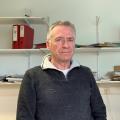Food, Global Health 5 min
SARS-CoV-2: INRAE’s research community in the Île-de-France region is mobilising
As the COVID-19 epidemic spreads throughout the world, the research community is mobilising its forces. In the Paris region, INRAE researchers Jean-François Eléouët and Bernard Delmas and their teams in the Molecular Virology and Immunology Unit (VIM) are hard at work: their aim is to accelerate their knowledge, prevent and cure the disease; each new goal corresponds to a new research project.
Published on 03 April 2020

Although there is every reason to believe that SARS-CoV-2 (Severe Acute Respiratory Syndrome Coronavirus 2) arose from bats (the natural reservoir of coronaviruses) nothing is known about the precise origin, transmission or potential for evolution of the coronavirus that causes the new infectious respiratory disease called COVID-19 (CoronaVirus Disease 2019). No preventive or curative treatments are available. Faced with the current epidemic and its corollary of human and economic catastrophe, the French research community is gathering its forces: fundamental research, projects on diagnostic, clinical and therapeutic options, epidemiology and human and social sciences; the scope is enormous and INRAE teams specialised in virology are central to these efforts.
At the heart of the Île-de-France region, two specialists in respiratory viruses, Jean-François Eléouët and Bernard Delmas, both INRAE Research Directors, together with their teams and colleagues in the Molecular Virology and Immunology Unit, are already getting down to the job.
Screening antiviral compounds that target SARS-CoV2
Handling the SARS-CoV-2 virus is complicated because it is so dangerous. Funded in the context of the REACTing Consortium, the fundamental research project being led by Jean-François Eléouët, Bernard Delmas and their colleagues aims to build a replicon for SARS-Cov-2 (or in other words, a defective, non-infectious viral particle that can replicate in cells in culture) in order to test different antiviral compounds on these cells. Because it is not dangerous, this replicon does not involve the risks linked to handling SARS-Cov-2 so offers a high-performance, inexpensive and easy to use tool for medium and high-throughput screening.
Identifying immunised individuals and evaluating the duration of immunity
In collaboration with Marie-Anne Rameix-Welti and her team in the Infection and Inflammation Unit (INSERM, Université de Versailles - St Quentin-en-Yvelines), Jean-François Eléouët and his colleagues are currently developing a serological screening test for COVID-19. This test is based on an antigen-antibody reaction using recombinant SARS-CoV-2 antigens and two coronaviruses that cause the common cold in humans, HCoV 229E and OC43, in order to verify the test’s specificity.
Similar studies are also under way in other countries. The work carried out by the INRAE/UVSQ teams will make it possible to determine the proportion of the population that has actually been infected (from which it will be possible to deduce the number of asymptomatic individuals), and to monitor protective antibody levels in the blood over time. The production of the necessary antigens is already under way.
Knowledge, skills and considerable humility
Jean-François Eléouët, Bernard Delmas and their teams are already closely acquainted with viruses. During the 1980s and 1990s, they worked on a porcine coronavirus, Transmissible GastroEnteritis Virus (TGEV) in their unit, which was led at that time by Hubert Laude – now Honorary Research Director at INRAE.
After TGEV disappeared naturally, the three scientists took their research down different paths.

“It was three years before the appearance of SARS-1”, remembers Jean François Eléouët.
A single concern – virology – and two different but complementary directions: respiratory syncytial virus and influenza for JF. Eléouët and B. Delmas, and prion diseases for H. Laude.
The goal pursued by Jean-François Eléouët and Bernard Delmas? To better understand the molecular mechanisms that govern the replication of these viruses with lung tropism, using the tools provided by cell biology, molecular biology, biochemistry and genetics, and to achieve their eradication using specific antiviral compounds.
They have been working towards this goal for many years, accumulating considerable experience and know-how that they are now able to apply to the fight against SARS-CoV-2. In a way, this is a return to their roots and the start of a long road that will be paved by numerous research projects, some of which have already been initiated and others that are coming to light.
Carried out between 2014 and 2018, the EPICOREM project, in which the INRA-ENVA-ANSES Joint Research Unit for Virology was a partner, adopted a multidisciplinary and global One Health approach and was able to generate new knowledge on the genetic diversity of coronaviruses in different ecosystems ranging from wildlife to humans, and on genetic evolutionary dynamics in hosts. The project also enabled the development of methodologies for the sampling and preparation of different fragments of genetic material (libraries) adapted to new generation technologies. The scientists are currently pursuing their work on the ecology of coronaviruses so as to better document the origin of their diversity, the mechanisms underlying their evolution and their adaptation to new hosts, so that they can determine priority sites for study. EPICOREM received funding from the French National Research Agency (ANR).
